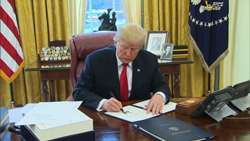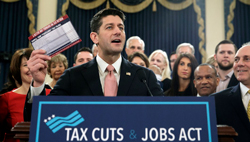President Donald Trump and the Republican majority in Congress passed their long-anticipated tax reform bill on Dec. 20, 2017.
The bill passed the Senate 51 to 48, with no support from the Democrats and all support from Republicans present—Sen. John McCain (R-AZ) did not vote due to his undergoing cancer treatment, though he voiced his support for the bill.
The bill calls for a permanent cut to corporate tax rates from 35 percent to 21 percent, which Congressional Republicans and the President say will allow companies to hire more people and pay higher wages for their employees.
However, there is no requirement in the bill for companies to hire Americans in order to receive the lower tax rate; corporations can keep more profit from the tax deduction even if they fire workers.
Jeffrey Christakos, a specialist professor of accounting at Monmouth, says “If the goal is specifically to put Americans back to work, a better course of action may be to increase the tax effectiveness of investing in people…as opposed to lowering the tax rate, and allowing companies and their owners [to] make their own decisions.”
“Unless the law requires that businesses invest in specific areas to gain tax deductions to create the tax savings, companies will invest their investment capital into areas that provide the highest rates of returns,” Christakos explains.
Situations such as that with Walmart and its affiliate Sam’s Club demonstrate Christakos’ point; there was no requirement for companies to invest in its workers in order to receive the tax cuts. Although Walmart raised its minimum wage to $11-an-hour, it nevertheless closed 63 Sam’s Club stores which left 10,000 workers unemployed.
 The bill also cuts individual tax rates for all income levels. Stephen Chapman, Ph.D., an assistant professor of political science, says that although the bill will reduce taxes, “most of the decrease will be seen in the upper percentiles of wealth in terms of dollar amounts.”
The bill also cuts individual tax rates for all income levels. Stephen Chapman, Ph.D., an assistant professor of political science, says that although the bill will reduce taxes, “most of the decrease will be seen in the upper percentiles of wealth in terms of dollar amounts.”
According to the nonpartisan Tax Policy Center, families who earn an annual income of less than $25,000 will see an average tax cut of $60 and those with an annual income of more than $733,000 would see an average cut of $51,000.
However, unlike the permanent corporate tax cut, the breaks for individuals are set to expire in coming years; those expirations dates were set to comply with the Senate limits on how much their legislation could add to the national deficit and Republicans say a future Congress will need to extend the cuts in order to make them permanent.
“This would remain relatively stable for at least seven years,” Chapman says.
“Essentially, the bill relies on the concept of trickle-down economics: giving more tax cuts to the wealthy and corporations, thereby energizing the economy and the effects [proposedly] wash down to lower income brackets,” Chapman says.
“There is little evidence that supports this type of theory, with multiple studies showing that it does little to help boost the economy and that most people transfer tax breaks to savings, thereby accumulating more wealth.”
According to the bill, the standard deduction, which is taken by many middle- and low-income households would double; and a child tax credit would be expanded.
However, other provisions such as a deduction on interest paid on new-home mortgages and a provision that allows Americans to deduct what they pay in state and local taxes would be reduced.
Among the states to be affect most adversely by the latter provision are New York, New Jersey, and California—states with the highest taxes.
As such, of the 12 Republicans who voted against the bill in the House, 11 were representatives of districts in those aforementioned states.
“Many in my area could face higher taxes under this plan,” Rep. Darrel Issa (R-CA) said before the vote last December. “Californians have entrusted me to fight for them. I will not make the incredible tax burden they already endure even worse.”
Christakos explains that due to the change in state and local tax deductions, many New Jersey homeowners will see their income tax bill go up. “Many believe they may see a drop in the value in their home,” he adds.
The Joint Committee on Taxation (JCT), Congress’ official tax scorekeeper, projected that the bill would add $1 trillion to the deficit over a decade, even with projected economic growth taken into account.
A deficit that potentially threatens Social Security and Medicare, which Chapman says will spark another partisan fight in Congress. “Deficit hawks [will push] to pay for the tax cuts and liberals [will want] to maintain the social safety net,” he says.
Additionally, the JCT projected that the plan would boost economic growth by 0.8 percent—whereas House Speaker Paul Ryan (R-WI) said the bill would get three percent economic growth.
House Minority Leader, Rep. Nancy Pelosi (D-CA), has called the bill “the worst in the history of the United States Congress.”
“I have said that this was stiff competition by some of the other things they have put forth,” Pelosi said during House floor debate on the tax proposal.
“Now, how can I make that claim? Well, because it involves more money, hurts more people, increases the deficit by so much more, and…the consequences of this bill, a multitrillion dollar economy being addressed by a bill that had no hearings, [and] no expert testimony.”
The tax bill also aims to repeal a major Affordable Care Act (ACA) provison: the individual mandate that required individual Americans to purchase health insurance.
“Obamacare has been repealed,” Trump said after the bill passed, referring to the repeal of the indivual health insurance mandate. However, many aspects of the ACA still remain intact.
“Because Republican efforts to repeal the Affordable Care Act failed, they’re trying to turn this bill into a health care bill by repealing the ACA’s individual mandate,” Sen. Kamala Harris (D-CA) tweeted on Dec. 17, 2017, before the bill passed.
“13 [million] more people will become uninsured in the next decade, and many face premium increases of up to ten [percent.]”
Alexis Borrino, a sophomore primary-education student at Monmouth, is concerned about the decrease in deductions for teachers who buy their own school supplies.
“Even though tax cuts seem like a good idea to a majority of the American population, I think [the bill] fails to take teachers into consideration. A school teacher’s starting salary is not all that high in the first place, so putting aside money for expensive supplies while trying to keep up with bills and a comfortable lifestyle is hard to do,” Borrino says.
“It seems especially unfair because of how important teachers are in shaping our children’s futures. I understand cutting spending it not easy whatsoever to do, but funding for education and educators should not be the [primary] area for funding cuts.”
Lauren Gnowinski, a freshman undeclared student, also worries about how the deduction decrease for teachers will affect her in the future.
“I have friends whose parents are teachers, and they are always talking about how hard it is to build their classroom and still manage to pay for things like food for their families and bills,” Gnowinski says.
“I’m concerned because, as a future teacher, I want to make sure that I can create an environment in which my students will be best able to learn; however, teachers don’t make a high salary to start with and to buy supplies from their own pockets is tough on their own budgets.”
IMAGES TAKEN from CNN


